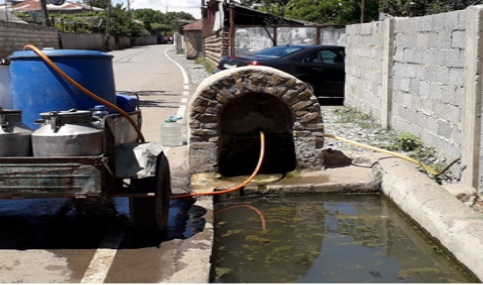Statement of Human Rights Center about social-economic problems of the people living near the occupation line
June 26, 2020

On June 22, 2020 the representatives of Human Rights Center visited the villages Takhtisdziri and Dirbi in Kareli municipality. The Russian occupation forces started illegal borderization in these villages in April 2020 – they installed poles and barbed wires. As a result, the agricultural plots of the local inhabitants turned up on the occupied territory.
The locals lost access to the land, which they had been cultivating for years and the land was the only source of income for their families. HRC representatives talked with several families in Takhtisdziri, who lost the plots. According to their information, the family owned over one hectare land, where they had various plants and trees; now the land is on the other side of the barbed wires. The locals said that before borderization, they applied to the National Agency of Public Registry to register the plots but they refused saying that the land was located nearby the occupation line. The state did not offer the family alternative land or compensation for the lost property.
This fact once again demonstrates inconsistentinconsequent policy of the State towards the registration of agricultural plots near the occupation line that contradicts the principles of human rights and violates the property rights and right to free movement of the local population. In this regard, the case of Ilia Beruashvili is also worth to mention, whose land is located close to the occupation line in Ditsi village, Gori municipality – in the territory which is under the control of Georgia. The NAPR refused Ilia Beruashvili to register his plot in 2018 claiming that it was located on the occupied territory that was incorrect information because the land was not in the occupied territory. As a result of the HRC legal advocacy, the common courts of Georgia passed verdicts in favor of the applicant and ordered the NAPR to register the land on Ilia Beruashvili1.
HRC assists another citizen, who also has problems with regard to the agricultural land located in the occupied territory. He is a resident of Akhrisi village in Gori municipality, and lost access to his plot in 2012 after the barbed wires were set up in their village. As a result, he lost possibility to cultivate the land and get harvest there. Nevertheless, the Revenue Service ofpf Georgia charged him with the property tax for the land. As a result of legal aid of HRC, the State lifted the property tax charges from the applicant. HRC appealed respective state bodies to provide the citizen with the alternative land in the other territory.
Human Rights Center calls on the authority:
To develop consistentelaborate consequent state policy about the registration of the lands located close to the occupation line, which will be coherent with the human rights principles;
To promote unlimited access of the locals to their agricultural plots;
To register the plots on their factual owners;
when the agricultural land is misappropriated as a result of illegal borderization, the state shall offer alternative land to the locals in the other territory
Besides the problems caused by illegal borderization, for what the local population has limited access to the natural resources like forest, pastures and land, the inhabitants of the villages close to the occupation line face other gravehard socioal-economic problems. Many villages near the occupation line have restricted access to are not supplied with drinking water or are supplied with the poor quality water. Another problem is lack of or demolished irrigation channels for what the locals cannot cultivate their plots. In Dirbi village the locals have been supplied with undrinkable water for years. The problem must be resolved by the local municipal government immediately. The local population also complained that there are no irrigation channels in their village and they cannot cultivate their plots and get harvest. As a result, they have limited sources of income.
In the photo, the inhabitants of Dirbi village in Kareli municipality stand in the queue to collect drinking water. Approximately ten people were waiting for their turn in this line. More than ten people were waiting for their turn.
News
December 13, 2023
Ethnic minorities outside the peace dialogue
November 6, 2023
‘Peace’ agenda of political parties
Popular
Articles
February 13, 2024



